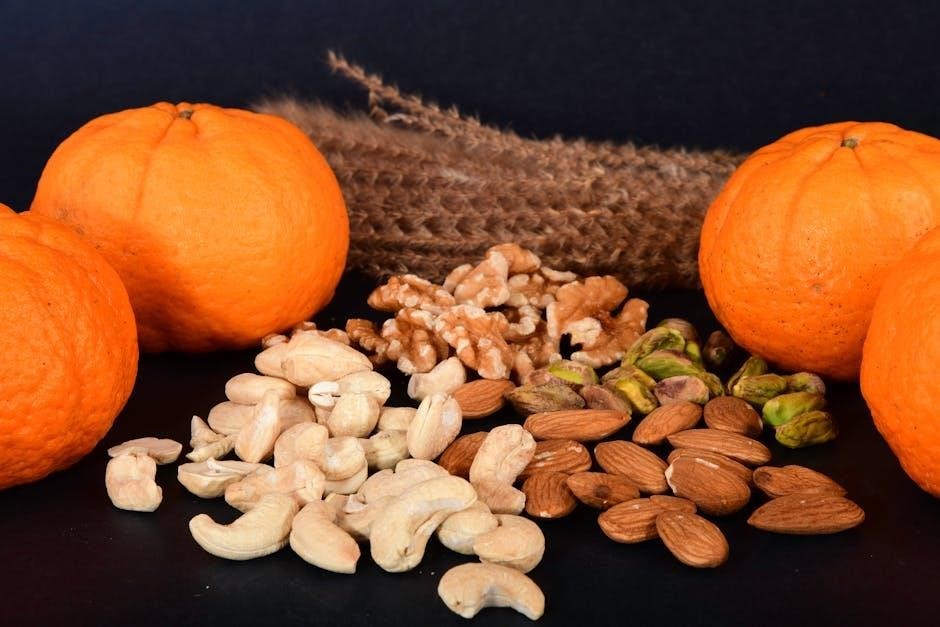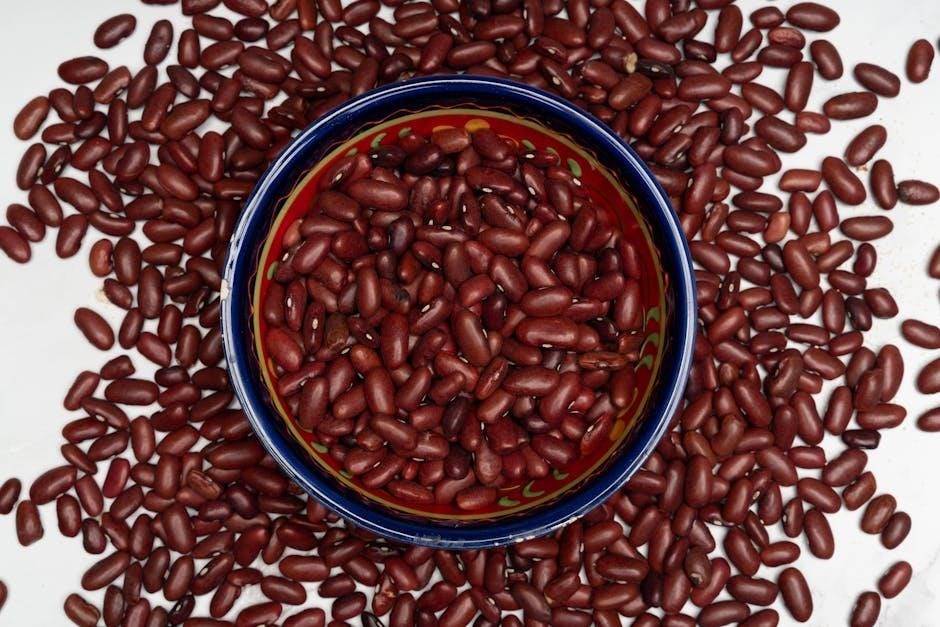
Zero carb foods are ideal for low-carb diets, promoting weight loss and blood sugar control. They include meats, seafood, eggs, and select vegetables, aiding in ketosis and metabolic improvement.
Understanding the Concept of Zero Carb Foods
Zero carb foods are those that contain negligible or no carbohydrates, making them ideal for low-carb and ketogenic diets. These foods primarily include meats, poultry, seafood, eggs, and certain low-carb vegetables. The concept emphasizes eliminating digestible carbs, focusing instead on protein-rich and high-fat foods. While some foods may have trace carbs, they are considered “zero carb” due to their minimal impact on blood sugar and insulin levels. This approach helps individuals maintain ketosis, promoting fat burning and weight loss. It’s important to choose whole, unprocessed foods to avoid hidden carbs, ensuring adherence to the diet’s principles for optimal results.

Importance of Zero Carb Foods for Low-Carb Diets
Zero carb foods play a crucial role in low-carb diets by eliminating glucose spikes and promoting ketosis. They help reduce insulin levels, enabling the body to burn fat efficiently. These foods are essential for maintaining metabolic health and supporting weight loss. By focusing on meats, seafood, and low-carb vegetables, individuals can sustainably follow a ketogenic or low-carb lifestyle. Incorporating these foods helps avoid cravings and stabilizes energy levels, making it easier to adhere to dietary goals. Overall, zero carb foods are fundamental for achieving and maintaining the benefits of a low-carb regimen, such as improved blood sugar control and enhanced fat metabolism.

Categories of Zero Carb Foods
Zero carb foods are categorized into meats, poultry, seafood, eggs, dairy, select vegetables, and fats. These groups provide essential nutrients while eliminating carbohydrates, supporting low-carb lifestyles effectively.

Meat and Poultry
Meat and poultry are cornerstone zero-carb foods, offering rich protein and essential nutrients. Beef, including steak and ground beef, is entirely carb-free. Similarly, poultry like chicken, turkey, and duck contain no carbs, making them ideal for low-carb diets. Pork, such as bacon and pork chops, is also carb-free, though it’s important to check for added sugars in processed varieties. Organ meats like liver and kidney are nutrient-dense and zero-carb. These options provide versatility in meal planning, supporting weight loss and metabolic health without compromising on flavor or nutrition.
Seafood and Fish
Seafood and fish are excellent zero-carb options, providing essential nutrients and flavor to low-carb diets. Oysters, clams, and other shellfish are naturally carb-free and rich in protein. Fatty fish like salmon, tuna, mackerel, and sardines are not only zero-carb but also high in omega-3 fatty acids, which support heart health. White fish, such as cod and tilapia, are lean and carb-free, making them versatile for various recipes. Shrimp, crab, and lobster are also great choices, offering both protein and flavor without any carbs. These seafood options are ideal for maintaining a zero-carb lifestyle while ensuring adequate nutrition and variety in meals.

Eggs and Dairy Products
Eggs and dairy products are versatile and nutritious additions to a zero-carb diet. Eggs are a perfect zero-carb food, rich in protein and healthy fats, making them ideal for breakfast or snacks. Dairy options like cheese, butter, and unsweetened Greek yogurt are also carb-free and provide essential nutrients. Hard cheeses, such as cheddar and Parmesan, are popular choices, while soft cheeses like cream cheese and ricotta offer versatility in recipes. Additionally, unsweetened nonfat yogurt and cottage cheese are great for those seeking low-calorie, high-protein options. These products not only enhance meal variety but also support overall dietary goals by providing sustained energy and satisfaction.
Vegetables and Fruits

While most vegetables and fruits contain carbs, some options are extremely low in net carbs, making them suitable for a zero-carb diet. Non-starchy vegetables like broccoli, spinach, kale, and zucchini are excellent choices, providing essential nutrients without significant carb content. Certain fruits, such as avocados, strawberries, and raspberries, are also low in carbs and rich in healthy fats and antioxidants. These foods add variety and nutrients to a zero-carb meal plan, supporting overall health and satisfaction. Incorporating them in moderation ensures a balanced diet while maintaining carb restrictions.
Oils, Fats, and Condiments

Oils, fats, and condiments are crucial for a zero-carb diet, providing essential fatty acids and flavor. Healthy options include avocado oil, olive oil, coconut oil, and butter, which are rich in saturated and monounsaturated fats. Condiments like mustard, vinegar, and herbs add taste without carbs. Ensure labels are checked for hidden sugars or starches. These items enhance meals and support fat intake, vital for sustained energy on a low-carb regimen.

Benefits of Incorporating Zero Carb Foods
Zero carb foods promote weight loss, improve blood sugar control, and boost energy levels. They support ketosis, enhancing metabolic health and reducing hunger, making them ideal for low-carb lifestyles.
Weight Loss and Improved Metabolism
Zero carb foods are highly effective for weight loss, as they eliminate insulin spikes, promoting fat burning. By reducing carbohydrate intake, the body shifts to ketosis, using stored fat for energy. Protein-rich foods like meats and seafood boost metabolism, helping burn calories more efficiently. Lower insulin levels also reduce water retention, leading to rapid weight loss. Additionally, zero carb diets suppress appetite, making it easier to maintain a calorie deficit. Incorporating non-starchy vegetables like broccoli and spinach further supports weight management by providing essential nutrients without added carbs. This approach not only aids in shedding pounds but also improves overall metabolic health for sustained results.
Enhanced Blood Sugar Control
Zero carb foods significantly improve blood sugar levels by eliminating glucose spikes. Diets low in carbohydrates reduce insulin resistance, stabilizing blood glucose naturally. Foods like lean meats, fish, and eggs provide sustained energy without raising blood sugar. Non-starchy vegetables such as spinach and broccoli add fiber, slowing digestion and preventing sudden glucose spikes. This approach is particularly beneficial for those with diabetes or prediabetes, helping manage conditions effectively. By avoiding sugary and high-carb foods, individuals can maintain consistent blood sugar levels, enhancing overall health and reducing the risk of complications associated with blood sugar fluctuations.
Increased Energy Levels
Zero carb foods enhance energy levels by providing a steady supply of nutrients without causing blood sugar spikes. Protein-rich foods like meats, fish, and eggs sustain energy throughout the day. Healthy fats from avocados, nuts, and olive oil are efficient energy sources, reducing fatigue. Low-carb vegetables like spinach and broccoli offer essential vitamins and minerals, supporting energy production. By avoiding high-carb foods, the body maintains stable energy levels, preventing midday crashes. This diet also reduces inflammation, which can drain energy, and supports mitochondrial function, the body’s energy-producing structures. Consistent energy levels make it easier to stay active and focused, improving overall daily performance.

Practical Tips for Maintaining a Zero Carb Diet
Plan meals, shop for zero-carb staples, and avoid hidden carbs in processed foods to sustain a zero-carb lifestyle effectively.
Meal Planning and Grocery Shopping
Effective meal planning is crucial for maintaining a zero-carb diet. Start by creating a weekly meal schedule, focusing on protein-rich foods like meats, poultry, and seafood. Use a zero-carb foods list to identify suitable options. When grocery shopping, stock up on staples such as eggs, cheeses, and low-carb vegetables like broccoli and spinach. Avoid processed foods, as they often contain hidden carbs. Consider using a printable zero-carb grocery list to stay organized and ensure you don’t miss essential items. Planning ahead helps prevent carb cravings and keeps your diet on track, making it easier to achieve your health and weight goals.
Cooking Techniques for Zero Carb Foods
Cooking zero-carb foods requires simple yet flavorful techniques to enhance their natural taste. Grilling, baking, or pan-frying meats like beef, chicken, and seafood are excellent methods. Use olive oil or avocado oil for cooking, as they are zero-carb and add healthy fats. For vegetables, opt for roasting or sautéing with herbs and spices to avoid added carbs. Eggs can be boiled, fried, or made into omelets with cheese or vegetables. Seafood like salmon or shrimp can be cooked with butter and garlic for extra flavor. Stir-frying low-carb vegetables like broccoli or spinach with soy sauce or vinegar is another versatile option. These techniques ensure meals stay satisfying and carb-free, making zero-carb diets easy to maintain.
Avoiding Hidden Carbs in Everyday Products
Hidden carbs are common in everyday products, making it crucial to carefully review labels. Many processed foods, such as sauces, dressings, and snacks, contain sugars or starches. Even seemingly carb-free items like bacon or cheese may have added sugars. Always check the nutrition label for hidden carbs. Opt for unsweetened and unflavored versions of products like yogurt, condiments, and beverages. Be cautious with packaged meats, as some contain added sugars or fillers. Rely on whole, unprocessed foods like meats, eggs, and vegetables to minimize exposure to hidden carbs. This ensures your zero-carb diet remains effective and aligned with your goals.